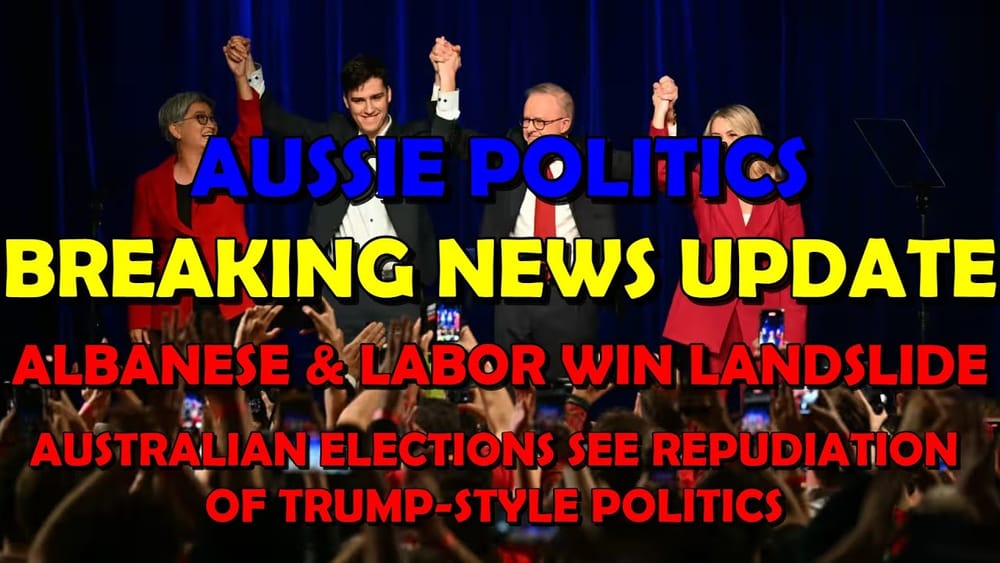Breaking News: Australian #Elections See Albanese & Labor Win in Landslide
Table of Contents 📖
"We do not need to beg or borrow or copy from anywhere else. We do not seek our inspiration overseas. We find it right here, in our values and in our people." - Anthony Albanese (as quoted by Jonathan)
Hello Team
🎦 00:00.000-00:29.980
- Jonathan welcomes viewers to an ATP Geopolitics video, providing a breaking news update outside of the usual Ukraine war coverage.
- The focus is on the Australian election, which has just concluded with a "pretty staggering victory" for the Australian Labor Party, led by Anthony Albanese.
- This victory is described as being against the odds, especially considering polling data from February and earlier.
Australian Political Landscape: Labor vs. Liberal National Coalition
🎦 01:00.000-01:38.780
- Jonathan notes the significant polling changeover since February and the interesting level of success for the Labor Party.
- He clarifies the main political players:
- Australian Labor Party: Broadly equivalent to the Democrats in the US.
- Liberal National Coalition: Essentially the Conservative Party, or Republicans in the US context.
- Trade unions are highlighted as an important and somewhat divisive factor in Australian politics.
Initial Election Results Analysis: Labor Gains, Peter Dutton Loses Seat
🎦 01:38.780-02:08.760
- Jonathan presents an analysis of the election board (from about half an hour prior to his recording).
- The results show the extent of Labor's victory, indicating they not only held their seats but also successfully took seats from the Liberal National Coalition.
- Notably, Peter Dutton, who had aspirations of becoming prime minister, lost his seat.
News Report: Detailed Election Board Breakdown – Labor's "Red Wall", Coalition Losses, Independent Successes
🎦 02:09.660-03:25.680
Jonathan plays a news clip analysing the election results:
- The "big board" illustrates the scale of Labor's win.
- Labor's Performance:
- Successfully defended its existing seats, maintaining its "red wall" against Coalition incursions.
- Made significant inroads into Coalition territory, claiming marginal seats like Leichhardt and Braddon (which saw a ~15% swing to Labor).
- Independent Successes: A notable number of independents were returned to the crossbench, including Dai Le in Fowler, and wins in Curtin, Kooyong, Mackellar, Goldstein, Wentworth, Indi, Warringah, Mayo, and Clark. Nicolette Boele (the transcript mentions Buller, but likely refers to Nicolette Boele who contested Bradfield) took Bradfield from the retiring Paul Fletcher.
News Report: Further Seat Projections, Greens' Limited Impact, Coalition's Deep Losses
🎦 03:25.680-03:58.720
The news clip continues with projections:
- Greens' Performance: Ahead in Ryan (metropolitan Brisbane) and Richmond, but no Greens were on the board in the previous count of confirmed seats.
- Coalition's Losses: Emphatically, there is "no Blue" (Coalition colour) on the Labor side of the board, indicating a failure to gain seats.
- The Coalition, which needed to gain an extra 19 seats, has instead lost 14.
News Report: Liberal Party Wiped Out in Tasmania
🎦 03:58.720-04:17.680
The news report highlights Tasmania as an example of the Coalition's losses:
- There is "no blue on the board for Tasmania."
- The Liberals have been "wiped out" of the state of Tasmania.
- The clip was about to check in with analyst Casey Briggs on the swing in Tasmania and elsewhere.
Jonathan's Commentary: Significant Swing Confirmed, Greens' Underperformance
🎦 04:17.900-04:25.740
- Jonathan comments that the news clip clearly shows a "big swing" in the election.
- He also notes that, incidentally, the Greens have not performed very well.
Explanation of Australia's Preferential Voting System
🎦 04:25.740-08:03.666
Jonathan explains Australia's preferential voting system:
- Voters rank candidates from first to last on ballot papers.
- House of Representatives:
- A candidate needs 50% of the vote to win their electorate.
- If no candidate achieves 50% in the first count (which is common with multiple candidates), the system differs from "first past the post" (used in the UK, Canada, US).
- In first-past-the-post, a candidate can win with a plurality (e.g., 35%), meaning a majority (65%) may not have voted for them and might even oppose them.
- In Australia's system, if no one reaches 50%, the candidate with the fewest first-preference votes is eliminated.
- The votes for the eliminated candidate are then redistributed according to the second preferences marked on those ballots.
- This process continues, eliminating the lowest-polling candidate and redistributing their preferences, until one candidate secures more than 50% of the vote.
- Jonathan refers to the Australian Electoral Commission (AEC) for this explanation.
Analyst Kos Samara: Young Voters' Preferences Key to Labor's Victory
🎦 08:05.666-09:42.186
Jonathan quotes pollster Kos Samara from a Guardian live blog:
- Labor successfully captured more young Australian voters (Millennials and Gen Z), though often not as their first preference.
- Younger voters, often disliking "establishment parties," may have voted for fringe parties initially.
- When these fringe parties were eliminated (not getting over 50%), their second preferences were more likely to flow to Labor than to the Liberal National Coalition.
- Samara states that while many in these generations (over 6 million voters) strayed from major parties, they still preferred Labor over the Coalition.
- He dismisses the Coalition's narrative of a "mythical voter out there that votes for minor parties, that is right-wing, that loves the culture wars" as false.
Analyst on Coalition's Campaign: "Doge-Style" Policies of Pain and Nigel Farage Comparison
🎦 09:42.426-11:50.586
Jonathan plays a clip of an analyst (likely Kos Samara continuing):
- The analyst reiterates that young voters, unhappy with the duopoly, preference Labor.
- The Coalition's campaign began by "promising to hurt 40,000 Australians by sacking them," then "promising to hurt a whole bunch of working mums by forcing them back to work, back to the office."
- This was described as a "suite of policies that were all about pain and no hope," labelled as "Doge-style policies."
- Jonathan draws a parallel to Nigel Farage in the UK, who, after Reform's local council successes, threatened DEI hires and opposed working from home, adopting a "Trump message, the Doge message."
- Jonathan notes this approach was seen as unpopular in Australia, hence the election result.
Factors Behind Labor's Historic Win: Strong Campaign, Opponent's Weaknesses, and the "Trump Factor"
🎦 11:50.586-12:59.972
The analyst discusses the reasons for Labor's large victory:
- Multiple factors contribute to such a win.
- Opponent's Failings: The Coalition (and its leader, Dutton) needed to be "completely hopeless and culturally blind," which they were.
- Labor's Strong Campaign: Labor ran a "really bloody good campaign," with Paul Erickson credited for a professional and effective effort.
- Dutton's Missteps: Dutton was perceived as "not very good," "fluffed it," and was too pro-Trump. Attempts to distance from Trump came too late.
- External Factors: The "Trump factor" also played a role.
- These elements combined to produce a "historic" result.
Anthony Albanese's Victory Speech: Themes of Unity, Humility, and Positive Vision
🎦 13:06.552-14:58.172
- Jonathan praises Anthony Albanese's acceptance speech as "really good," highlighting themes of unity, humility, and more.
- He plays a clip of a Labor politician reflecting on Albanese's language and vision.
- Jonathan found Albanese's full speech "excellent," "really positive," and in stark contrast to Donald Trump's self-aggrandising style.
- Albanese's speech focused on Australia, unity, gratitude, humility, empathy with the electorate, and serving all while acting as one country. Jonathan admits to getting "a bit emotional" due to its positive vision.
Politician's Reflection: Albanese's Emphasis on Kindness and Inclusive Leadership
🎦 14:59.952-16:20.232
A Labor politician (likely Jim Chalmers, based on common pairings with Katy Gallagher as Finance Minister) comments on Albanese's speech:
- Highlighted Albanese's return to the theme of "kindness is not a weakness."
- Posed the question: "When did it become weakness to be kind or generous or inclusive or gracious?"
- Praised Albanese's leadership style: he "doesn't hoard power... he shares it," making for an enjoyable government.
- Stated that the team respects and is proud of Albanese because he "genuinely leads a team."
- Described Albanese as leading with strength but listening with humility, which was reflected in his speech.
- Jonathan agrees this was "really well put."
Election Outcome Summary and Jonathan's Preference for Preferential Voting
🎦 16:21.132-16:56.792
- Jonathan notes the clear results: Labor at 71 seats (76 needed to win outright), Coalition at 23 (the transcript says 23, earlier it said they lost 14, so the initial number would have been higher. This might be a partial count or a specific reference from the screen Jonathan was looking at). He describes it as a "hammering."
- He observes that the Greens seem to have taken a "beating" because they didn't fare well under the voting system and aren't getting much representation.
- Jonathan reiterates his opinion that Australia's preferential system is "much more preferred" to the British "First Past the Post" system.
- He concludes it's a "resounding victory for the Labour Party."
The "Trump Effect": How Peter Dutton's Campaign Mirrored and Suffered from Trumpism
🎦 16:57.932-20:06.958
Jonathan discusses a Guardian article (published before the election) about the "Trump effect" on Peter Dutton's campaign:
- The article argued the "Trump effect" crippled Dutton's campaign, explaining a dramatic collapse in support.
- Dutton's Actions Mirroring Trump:
- Attacking the Australian Electoral Commission (AEC) over voting methods (the "ticks and crosses issue" during the Voice debate in August 2023), casting doubt on election legitimacy, a tactic reminiscent of Trump's "stolen election" claims.
- Praising Trump as a "big thinker, shrewd, a dealmaker" even after Trump's controversial policy proposals (e.g., Palestinian displacement).
- Adopting policies around "indoctrination in schools," cuts to public service, attacks on diversity, and "Doge-style government efficiency units."
- Failing to adjust rhetoric even after Trump's remarks seemingly siding with Russia and blaming Ukraine for the war.
- Labelling Guardian Australia and ABC as "hate media," reflecting Trump's attacks on the free press.
- The article suggests Dutton only tried to distance himself from Trump very late, after Trump's tariffs threatened a trade war.
- Jonathan summarises that "trying to get into bed with Donald Trump as a campaign policy" was deemed partly responsible for the Coalition's poor result.
Economic Context and Coalition Campaign Miscalculations
🎦 20:06.958-21:24.538
Jonathan elaborates on other factors:
- Economic Factors:
- The central bank lowering interest rates just before the election was called was "very clever and very useful" for Albanese's campaign, which focused on the cost of living.
- However, this issue eased. Later, trade wars initiated by the US made any association with the US a "poison chalice," gifting Albanese more ammunition.
- Dutton's Policy Failings: Jonathan believes Dutton was failing anyway with policies associated with the Trump agenda.
- Coalition Campaign Timing: He references a Liberal politician admitting their policy points were made "too late in the day" and they should have presented their manifesto more clearly and earlier.
Jonathan's Personal View: Gladness at Labor's Win and Praise for Speeches
🎦 21:24.678-22:30.958
- Jonathan expresses his personal satisfaction with the election outcome: "I'm glad the Labour Party won."
- He feels their politics are "much more aligned to how I think" and "better, I think, for the world."
- He reiterates it was a "stomping victory" and praises the speeches again.
- Mentions Penny Wong (Senator for South Australia, involved in foreign policy) as "absolutely brilliant" in her introductory role and very popular.
- Describes Albanese's subsequent speech as "absolutely fantastic" and a "barnstorming speech that was also really, really positive."
Excerpt from Anthony Albanese's Acceptance Speech: "The Australian Way"
🎦 22:32.238-24:15.118
Jonathan decides to play the end of Anthony Albanese's acceptance speech:
- He notes Albanese's fiancée and son are present.
- Recommends a "really good interview" of Albanese on "The Restless Politics" podcast with Rory Stewart and Alastair Campbell, where Jonathan "warmed to him very much."
- Albanese's Speech Excerpt Highlights:
- "Australians have chosen the Australian Labor Party as their government."
- "Our government will choose the Australian way because we are proud of who we are..."
- "We do not need to beg or borrow or copy from anywhere else. We do not seek our inspiration overseas." (Jonathan notes this as a direct reference to Trump).
- "We find it right here, in our values and in our people."
- A dedication to service, renewing responsibility, and building Australia's future with pride, purpose, optimism, determination, and faith in the "fair go."
Wrap up
🎦 24:19.478-24:50.618
- Jonathan reiterates that Albanese's speech was very good.
- He invites viewers to share their thoughts.
- He states the latest stats are pretty conclusive that the Australian Labor Party did a "pretty good job" of winning the election.
- Noting that ABC (Australian Broadcasting Corporation) has ended its live analysis, Jonathan concludes his video.
- He signs off with "Take care and I'll speak to you soon."




